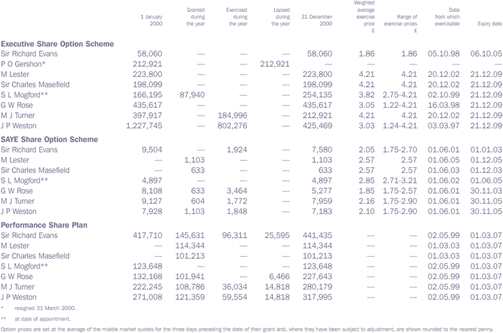Remuneration report
The Board of directors has delegated to the Nominations and Compensation Committee
(the Committee) responsibility for remuneration policy and specific packages for
individual executive directors and other senior executives of the company. All
members of the Committee are non-executive directors and are detailed in the list
of the Board of directors.
It is chaired by Sir Robin Biggam; the Chairman and the Chief executive officer
attend Committee meetings except where their individual positions and remuneration
are discussed.
The Committee also has responsibility for nominating suitable candidates for appointment to the Board; when acting in this role the Chairman is also a member of the Committee.
Remuneration policy
Following the merger between BAe and MES, and as a result of the acquisitions made since then, the company has a far greater presence outside the UK than was previously the case. Consequently the Committee felt that it would be appropriate to commission independent consultants to undertake a thorough review of the total remuneration packages for executive directors and other senior executives. This review has led the Committee to look to make certain changes to the remuneration policy. The Committee’s policy of setting basic salaries at median competitive levels and to reward upper quartile performance with potential upper quartile remuneration has been confirmed as a result of this review. However, it is recognised that this also needs to reflect the market in which the individual executive is generally based and to achieve this the Committee believes that the following changes should also be made:
The Committee looks to structure remuneration packages so as to both incentivise and reward executives whilst maintaining an appropriate balance between long and short-term performance. Executive directors are allowed to hold external non-BAE SYSTEMS related non-executive directorships with the prior approval of the Committee and the directors may retain any fees received for such appointments.
The Board believes that the company’s remuneration policy is compliant with the Combined Code which has sought to establish best practice in this area for UK companies. The Committee will continue to consult with principal shareholders when it is considering changes to the structure of the company’s executive director remuneration policy.
Remuneration
Remuneration for executive directors typically consists of basic salary, a bonus based on annual performance, executive share options, participation
in the long term incentive plan and retirement benefits. The following provides more detail of these elements.
Basic salary and benefits
Executive directors’ salaries are reviewed each year by the Committee and adjusted to reflect performance and the competitiveness of salaries relative to the market. Information on the market for comparable management positions is obtained from independent sources and is provided to the Committee so that it can form a view as to where to position basic salaries and benefits relative to comparable companies. All reviews of salaries and benefits for executive directors are made having taken full account of the performance of the company as a whole and the pay and conditions of group employees in particular. It is the company’s stated aim to create an environment with fair reward policies, which recognise and reward individual performance against business objectives; this applies equally to all employees.
The Committee has reviewed regularly the split between basic salary and performance related elements of remuneration in order properly to incentivise executive directors and believes that a significant proportion of remuneration should be based on schemes that encourage them to perform at the highest level. In addition, through the use of share based incentive schemes, it seeks to align the interests of executive directors with those of other shareholders.
Bonus Scheme
The executive directors and other senior executives participate in a Bonus Scheme that rewards those individuals if targets agreed by the Committee for Earnings Per Share (EPS) and cash performance are met.
In 2000 the Bonus Scheme was structured such that the bonus payable was equal to 5% of basic salary for the achievement of budgeted EPS targets and 25% for the achievement of more stretching EPS targets. Likewise a bonus of 10% was payable for achievement of budgeted cash levels and 20% for achieving a more stretching target. A maximum of 5% of basic salary was payable on performance against non-financial measures. Pro rata payments were payable for achievements between these targets.
As was the case in previous years, individuals who participated in the Bonus Scheme were given the option of taking the bonus partly or wholly in shares through the Restricted Share Plan. If an election is made to take shares through the plan, they are to be held in trust for a period of three years after which the company will give the individual an equal number of shares. The table below details cash bonuses earned in the year, and where executive directors elect to use such bonuses through the Restricted Share Plan.
The Committee has retained the right to vary the bonus should there be exceptional events that affect the bonus targets. Non-executive directors do not participate in the Bonus Scheme.
Directors' remuneration
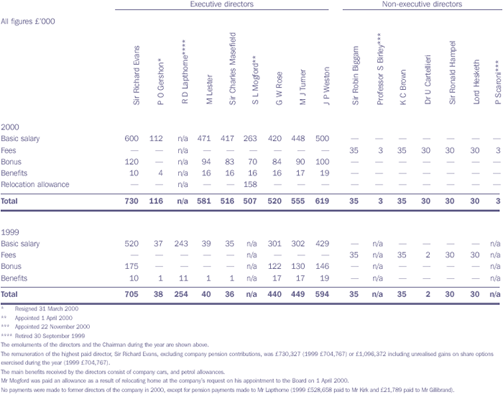
For the table to appear in a pop up window, please
click the image above
Long term incentive schemes
Through the Performance Share Plan, conditional awards of shares are made to executive directors. The maximum value of such awards in any one year is equal to the basic salary paid to a director, who at the end of the performance period receives a proportion of the award conditional on the performance of the company. Performance is measured relative to the other constituent members of the FTSE 100 over a three year period as follows:
This is the principal measure and, against a sliding scale, 100% of the conditional shares are awarded to directors if the company’s TSR is in the top 20% of TSRs achieved by FTSE 100 companies, with 10% vesting if the TSR is in the top 50%. Intermediate positions will be calculated on a straight line pro rata basis. No awards will be made if the company’s TSR performance is outside the top 50%. Awards will be made in three equal installments at the end of years three, four and five; and
EPS is used as a second measure and requires the average value of EPS excluding exceptional items over the performance period to be no less than the average value for the three years prior to the performance period.
Restrictive Share Plan

For the table to appear in a pop up window, please
click the image above
Both sets of performance criteria must be met in order for an award to be made under the Schemes.
Both of the above measures may be adjusted for exceptional items appropriate at the discretion of the Committee.
Prior to the introduction of the Performance Share Plan, executive directors were regularly granted share options through the Executive Share Option Scheme. Directors were granted options to the value of four times the level of their basic salary in any ten year period. The scheme is now only used in exceptional circumstances. It was used in 1999 following the MES merger to grant options to directors transferring to the company from GEC and to incentivise directors to achieve synergy cost savings resulting from the merger. In addition, it was used last year to grant options to Mr Mogford following his appointment to the Board.
Executive share options granted in 1994 and 1995 can only be exercised if growth in the pre-exceptional EPS for any three year period exceeds the sum of the increase in RPI for that period and a real growth requirement of 7.5%. Options granted to former GEC directors in 1999 are subject to similar performance criteria but the real growth requirement is 9% for any three year period. Other options granted to executive directors in 1999 are conditional upon the achievement of merger cost savings as validated by the company’s auditors. Options cannot be exercised within three years of the date of grant.
Details of directors’ interests in the Executive and SAYE Share Option Schemes and options and conditional awards made under the Performance Share Plan are shown in the table of Directors share options. Option prices are set at the average of the middle market quotes for the three days preceding the date of their grant.
The Committee is of the opinion that to give a full statement of directors’ share options would result in a statement of excessive length. It has therefore adopted the alternative recommendation proposed by paragraph A3 of the Urgent Issues Task Force Abstract 10. The company’s register of directors’ interests (which is open to inspection) contains full details of directors’ share holdings.
Details of the Performance Share Plan rights exercised by executive directors during 2000 are shown in the table of Options exercised.
The profit before dealing costs inherent in unexercised options capable of being exercised at a surplus and granted under the Executive Share Option Scheme, SAYE Share Option Scheme and rights under the Performance Share Plan as at 31 December 2000 were, subject to meeting any applicable performance criteria, as follows:
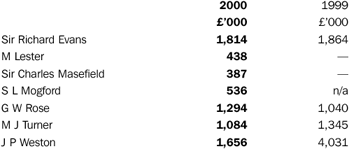
At 31 December 2000 directors held the following options at prices greater than the market value of the shares:
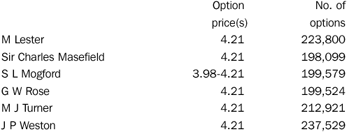
The figures have been calculated by reference to a mid-market price for the company’s ordinary shares at 29 December 2000 of 382p (1999 410p). The range during 2000 was 453p to 281p.
Options exercised
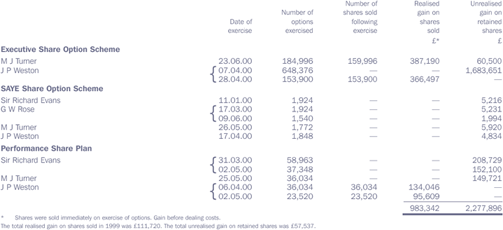
For the table to appear in a pop up window, please
click the image above
Personal shareholding policy
The Committee has agreed a policy whereby all executive directors are required
to establish and maintain a minimum personal shareholding equal to 100% of basic
salary. As a minimum standard this must be achieved as quickly as possible from
shares vested from the annual bonus, exercised through the Executive Share Option
Scheme or Performance Share Plan, by using 50% of the shares that vest or 50%
of the options which are exercised on each occasion. Thereafter, executive directors
will be expected to increase their personal shareholding gradually, on each occasion
using 25% of the shares that vest or 25% of the options exercised each year, until
a personal shareholding equal to 200% of annual salary is achieved and maintained.
These limits are reviewed periodically.
Post retirement benefits
The executive directors are members of group pension schemes and have a normal
retirement age of 60, with the exception of Mr Lester and Sir Charles Masefield
who have a normal retirement age of 62.
Of the executive directors, Mr Rose is affected by the Inland Revenue earnings cap on approved pensions and has an unapproved pension arrangement to top up his benefits from the approved schemes.
Mr Rose’s unapproved arrangement is partly funded and partly unfunded. The accrued benefits shown in the Post retirement benefits table include the benefits from the approved and unapproved arrangements.
Details of pensions earned by the directors are shown in the Post retirement benefits table.
Mr Gershon resigned as a director of the company on 31 March 2000. He was affected by the Inland Revenue earnings cap and had an unapproved pension arrangement to top up his benefits from the approved scheme. The unapproved pension arrangement is partly funded and partly unfunded. No contributions were made to the funded arrangement in the year. The unfunded pension payable by the company to Mr Lapthorne amounted to £77,389 during the year (£19,463 in 1999).
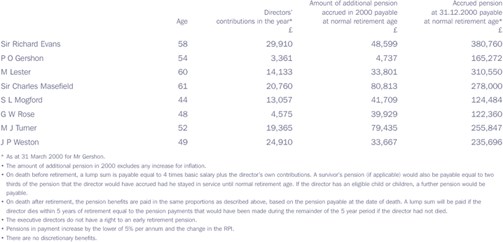
For the table to appear in a pop up window, please click the image above
Service contracts
All the executive directors have contracts requiring the company to give not less
than 12 months’ notice of termination. Sir Richard Evans, Mr Weston, Mr Rose and
Mr Turner have contracts requiring them to give the company not less than six
months notice of termination. All of the other executive directors are required
to give not less than 12 months notice of termination.
It is the Board’s policy that non-executive directors do not have service contracts. They are proposed by the Committee and appointed by the Board on the basis of their experience to provide independent judgement on issues of strategy, performance, resources and standards of conduct. Fees payable to non-executive directors are recommended to the Board by the Committee chairman after discussion with the executive directors. The level of non-executive director’s fees is set after reviewing practice in other comparable companies.
Both of the executive directors retiring by rotation at the Annual General Meeting have service contracts requiring the company to give not less than 12 months’ notice of termination and the individual six months. Sir Robin Biggam and Lord Hesketh are also retiring by rotation at the Annual General Meeting but are non-executive directors and do not have service contracts. Professor Birley and Mr Scaroni are offering themselves for election, and being non-executive directors they also do not have service contracts.
Directors' interests
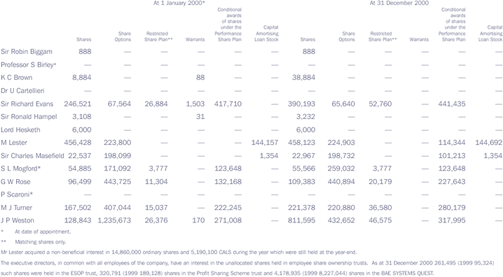
For the table to appear in a pop up window,
please click the image above
As at 31 December 2000 the directors of the company and their families had the beneficial interests in the company’s securities as shown in the Directors' interests table.
There have been no changes in the interests of the directors between 31 December 2000 and 28 February 2001.
By order of the Board
Sir Richard EvansChairman
28 February 2001
